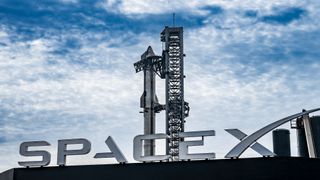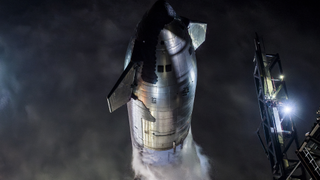What time is SpaceX's 3rd Starship launch test on today?
SpaceX is targeting a launch at 9:25 a.m. EDT on March 14.
Update for 9:58 a.m. ET: SpaceX successfully launched Starship on its third integrated test flight. Read our full coverage here.
SpaceX is hoping to launch its first Starship test of 2024 as early as Thursday (March 14) in what it hopes will be a historic orbital flight of the world's biggest rocket, and if you need to know when to watch it online, you're in the right place.
SpaceX is targeting March 14 for the launch from its Starbase facility near Boca Chica Beach in South Texas. The announced on X that Starship has a 110-minute window on Thursday, with liftoff targeted for 9:25 a.m. EDT (1325 GMT), about 30 minutes in.
The company will webcast the launch attempt, beginning at 8:52 a.m. EDT (1252 GMT). You can watch the livestream here at Space.com, courtesy of SpaceX. There is a 70% chance of good weather at launch time, SpaceX has said.
Related: See our SpaceX Starship and Super Heavy guide for a detailed look
SpaceX's Starship vehicle and its Super Heavy booster are the world's tallest and most powerful rocket. When stacked together, they stand 400 feet tall (122 meters), with the first stage powered by 33 Raptor engines, while the Starship upper stage carries six Raptors.
SpaceX has designed the Starship launch system to be fully reusable and hopes to use it for deep-space exploration, heavy-lift launches and space tourism. The company has already sold two private trips around the moon on Starship, with NASA picking Starship to land its Artemis 3 astronauts on the moon by 2026. But first, SpaceX has to prove its Starship can reach orbit, let alone the moon, and has failed to do so in two previous attempts in April and November of 2023. Here's what we know about Flight 3, SpaceX's third Starship test launch.
Get the Space.com Newsletter
Breaking space news, the latest updates on rocket launches, skywatching events and more!
What time is SpaceX's 3rd Starship launch?

Starship Die Cast Rocket Model Now $69.99 on Amazon.
If you can't see SpaceX's Starship in person, you can score a model of your own. Standing at 13.77 inches (35 cm), this is a 1:375 ratio of SpaceX's Starship as a desktop model. The materials here are alloy steel and it weighs just 225g.
Note: Stock is low so you'll have to act quickly to get this.
Today, SpaceX is targeting March 14 at 9:25 a.m. EDT (8:25 a.m. CDT/1325 GMT) for its third Starship test flight. That's about 30 minutes into a 110-minute launch window that opens at 8 a.m. EDT. The company will air a livestream of the liftoff, beginning at 8:52 a.m. EDT (1252 GMT ) on March 14.
SpaceX's first Starship test flight launched on April 20, 2023 but never reached space. It was intentionally destroyed after its two stages failed to separate. A second test flight on Nov. 18 did manage to reach space, but not its target altitude. The Super Heavy booster separated successfully from the Starship upper stage, but both vehicles eventually were destroyed shortly after stage separation.
"Each of these flight tests continue to be just that: a test," SpaceX wrote in a Flight 3 mission description. "They aren't occurring in a lab or on a test stand, but are putting flight hardware in a flight environment to maximize learning."
Related: How to watch SpaceX's 3rd Starship launch test online
Can I watch the 3rd SpaceX Starship launch?
Yes, you can watch SpaceX's third Starship launch online, and you'll likely have a few options by which to do so.
SpaceX will provide a livestream of the Starship launch on its @SpaceX account on X (formerly Twitter), starting 30 minutes before liftoff — that is, at 8:52 a.m. EDT (1252 GMT).
But, and this is very important, SpaceX's plans could change.
"As is the case with all developmental testing, the schedule is dynamic and likely to change, so be sure to stay tuned to our X account for updates," the company wrote in a mission overview.
SpaceX's livestream of the Starship Flight 3 launch will also be carried by Space.com on YouTube and will be embedded at the top of this page.
You can also find several independent livestreams of SpaceX's Starship launch that should include live commentary and views.
One site we like to follow is NASASpaceflight.com, which offers regular daily livestreams of Starship testing activities at the Starbase facility. The site will have extensive YouTube livestream coverage, likely beginning in the hours before SpaceX's own webcast. Another option is Everyday Astronaut, which provides live Starship launch coverage and commentary as well.
If you happen to be in the Boca Chica, Texas area and are hoping to view the launch in person, you have several options.
There is no official SpaceX viewing site, but you can pick from several public beach areas from which you can see the launch. The nearby South Padre Island offers clear views of the rocket from the shoreline around Cameron County Amphitheater and Isla Blanca Park. Similar viewing areas can be found around the nearby shore of Port Isabel and the surrounding areas.
I actually watched Starship Flight 1 launch in April 2023 from the South Padre Island shore near Cameron County Amphitheater, and it does offer unobstructed views, with crowds lining the beach and on boats in the harbor. However, you will want to bring a folding beach chair, water and sunscreen. (There are bathrooms on site.)
Wherever you opt to watch the launch from, plan to arrive very early as traffic can cause lengthy delays reaching observing sites.
How long is SpaceX's 3rd Starship flight?

The first two Starship test flights were designed to last 90 minutes, with the Starship vehicle reaching orbital speeds (if not actually entering orbit) and then returning to Earth with a reentry and splashdown off the coast of Hawaii.
Things may happen more quickly on Flight 3. SpaceX's mission description says that Starship's upper stage will splash down about 65 minutes after liftoff, if all goes according to plan.
There will be other differences as well.
"The third flight test aims to build on what we’ve learned from previous flights while attempting a number of ambitious objectives, including the successful ascent burn of both stages, opening and closing Starship's payload door, a propellant transfer demonstration during the upper stage's coast phase, the first ever re-light of a Raptor engine while in space, and a controlled reentry of Starship," SpaceX wrote in its mission description. "It will also fly a new trajectory, with Starship targeted to splash down in the Indian Ocean. This new flight path enables us to attempt new techniques like in-space engine burns while maximizing public safety."
Related: SpaceX to push the envelope on 3rd Starship launch
SpaceX's first Starship flight aimed to reach an altitude of 146 miles (234 kilometers) while traversing a flight path that aimed to splash down in the Pacific Ocean about 140 miles (225 km) from the coast of Oahu, Hawaii. The second flight path was largely the same.
While Starship aims for a different splashdown zone on Flight 3, the Super Heavy booster is still expected to make a soft landing and splashdown in the Gulf of Mexico, miles offshore from Boca Chica Beach.
| TIME (Hr:Min:Sec) | EVENT | Header Cell - Column 2 |
|---|---|---|
| T-1:15:00 | Flight director poll for fuel loading | Row 0 - Cell 2 |
| T-0:53:00 | Starship liquid oxygen loading begins | Row 1 - Cell 2 |
| T-0:51:00 | Starship liquid methane loading begins | Row 2 - Cell 2 |
| T-0:42:00 | Super Heavy liquid oxygen loading begins | Row 3 - Cell 2 |
| T-0:41:00 | Super Heavy liquid methane loading begins | Row 4 - Cell 2 |
| T-00:19:40 | Super Heavy Raptor engine chilldown | Row 5 - Cell 2 |
| T-00:3:30 | Super Heavy fueling complete | Row 6 - Cell 2 |
| T-00:2:50 | Starship fueling complete | Row 7 - Cell 2 |
| T-00:0:30 | Flight Director GO for launch | Row 8 - Cell 2 |
| T-00:00:10 | Flame detector activation | Row 9 - Cell 2 |
| T-00:00:03 | Raptor ignition sequence startup | Row 10 - Cell 2 |
| T-00:00:00 | Liftoff ("Excitement Guaranteed," as SpaceX puts it.) | Row 11 - Cell 2 |
| TIME (Hr:Min:Sec) | FLIGHT EVENT | Header Cell - Column 2 |
|---|---|---|
| T+00:02 | Liftoff | Row 0 - Cell 2 |
| T+00:52 | Starship/Super Heavy reach Max Q | Row 1 - Cell 2 |
| T+2:42 | Super Heavy main engine cutoff | Row 2 - Cell 2 |
| T+2:44 | Hot-staging separation/Starship Raptor engine ignition | Row 3 - Cell 2 |
| T+2:55 | Super Heavy boostback burn startup | Row 4 - Cell 2 |
| T+3:50 | Super Heavy boostback burn engine shutdown | Row 5 - Cell 2 |
| T+6:36 | Super Heavy is transonic | Row 6 - Cell 2 |
| T+6:46 | Super Heavy landing burn | Row 7 - Cell 2 |
| T+7:04 | Super Heavy landing burn shutdown | Row 8 - Cell 2 |
| T+8:35 | Starship engine cutoff | Row 9 - Cell 2 |
What if Starship can't launch?

If SpaceX is unable to launch on March 14, the company will likely make sure it has at least one or two backup days handy.
Officials with Cameron County, the Texas county that is home to SpaceX's Starbase facility, have released a beach closure advisory that suggests road closures around Starbase through March 16, hinting at possible backup dates. SpaceX has not set a specific range for launch dates, however.
Any second launch attempt would likely depend on how far into the fueling process SpaceX gets for Flight 3's first try. SpaceX has said it can take up to several days to resupply its propellant depot for a Starship launch, since the massive rocket and booster consume more than 10 million pounds of super-chilled liquid methane and liquid oxygen propellant.
If Space delays Flight 3 due to a technical glitch or malfunction, the timing of a new attempt would likely hinge on how long it takes to address the issue.
Editor's note: This story was updated on March 14 at 8:30 a.m. with a new 9:25 a.m. EDT launch time for SpaceX's Starship Flight 3.
Join our Space Forums to keep talking space on the latest missions, night sky and more! And if you have a news tip, correction or comment, let us know at: community@space.com.

Tariq is the Editor-in-Chief of Space.com and joined the team in 2001, first as an intern and staff writer, and later as an editor. He covers human spaceflight, exploration and space science, as well as skywatching and entertainment. He became Space.com's Managing Editor in 2009 and Editor-in-Chief in 2019. Before joining Space.com, Tariq was a staff reporter for The Los Angeles Times covering education and city beats in La Habra, Fullerton and Huntington Beach. In October 2022, Tariq received the Harry Kolcum Award for excellence in space reporting from the National Space Club Florida Committee. He is also an Eagle Scout (yes, he has the Space Exploration merit badge) and went to Space Camp four times as a kid and a fifth time as an adult. He has journalism degrees from the University of Southern California and New York University. You can find Tariq at Space.com and as the co-host to the This Week In Space podcast with space historian Rod Pyle on the TWiT network. To see his latest project, you can follow Tariq on Twitter @tariqjmalik.
-
pjw Can everyone please stop writing EST, CST, etc. Nobody needs to be told whether the time you're providing is in standard vs daylight savings time, and in cases like this article, it's just wrong because the author and editor don't bother you use the right one. Just write 8am ET and call it a day.Reply -
mydefposse Reply
Agreedpjw said:Can everyone please stop writing EST, CST, etc. Nobody needs to be told whether the time you're providing is in standard vs daylight savings time, and in cases like this article, it's just wrong because the author and editor don't bother you use the right one. Just write 8am ET and call it a day. -
COLGeek What is interesting here is that we haven't gone down the daylight saving argument path.Reply
Many think it was a farm thing. As someone who grew up on a farm, many moons ago, I can assure you it had no impact on our work day.
We adjusted as conditions changed.
Personally, I would do away with the annual changes. In a modern 24/7 world, its usefulness is debatable. -
Classical Motion It was a city slicker industrial doctrine of early last century for most. Who use it. I don't know of any who need it now.Reply
But unlike Ben Franklin, keep DST, not standard time, I don't want to get up at 4:30 in the morning. Ben took that early morning stuff too seriously. -
garyrich2000 Since PI out to 10 decimals is 3.1415926535, it seems tempting to set T zero at Mar 14, and 13760 seconds (03:49:20)Reply -
CGJon I find it amazing that with International interests especially space andReply
'military' matters we don't all stick with GMT or if you prefer to call it such UTC.
Anyone following these things, knows how much before or after UTC their locality is, irrespective of DST. -
Unclear Engineer Most people could care less about GMT. They only need to know when they need to get to work, or some other appointment. That is because they live by the clock in a city instead of living by the sun on a farm or ranch.Reply
So, as one of those persons who lived by the clock for my working career, I hated having to drag myself out of bed before dawn and drive in the dark to my office. When "daylight savings time" was extended deeper into the winter's short days, that made me do a lot of driving in the dark.
Now that I am retired, I get up with the sun, and go to bed when I am tired. Much less stress.
So, if the government is silly enough to make DST year-round, I hope that businesses will go back to adopting "summer hours", "winter hours" and maybe "spring/autumn" hours so that their employees are not unnecessarily getting up before dawn.

